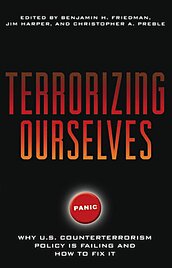Terrorizing Ourselves dismantles much of the flawed thinking that dominates U.S. counterterrorism policy today and lays out alternative approaches informed by experience, deliberation, and the well-established norms of a free society.
Leading experts in the field contributed to this important new book, which shows that politicians use fear for political purposes and spend vast sums of money on dubious security measures. These experts explore the nature of modern terrorism, explain and decry our panicked responses to it, and offer sober alternatives.
Beyond specific proposals for disrupting terror cells and improving homeland security efforts, Terrorizing Ourselves documents the many ways in which a climate of fear-mongering exacerbates the threat of terrorism.
Terrorists, the authors note, get their name for a reason. Fear is their chief tactic. Political forces push U.S. policymakers to hype this fear, encouraging Americans to believe that terrorists are global super villains who can wreck American society unless we submit to their demands. This book shows that policies based on this fantasy are self-defeating and bring needless war, wasted wealth, and less freedom. The authors explore strategies to undermine support for these policies. They also sketch an alternative counterterrorism and homeland security strategy—one that makes us safer and plays to Americans’ confidence rather than our fears.
The book’s chapters:
(1) Defeating al Qaeda by Audrey Kurth Cronin
(2) Terrorism as a Product of Choices and Perceptions by James J. F. Forest
(3) Are There ‘‘Root Causes’’ for Terrorist Support? Revisiting the Debate on Poverty, Education, and Terrorism by Mia Bloom
(4) Don’t You Know There’s a War On? Assessing the Military’s Role in Counterterrorism by Paul R. Pillar and Christopher A. Preble
(5) Assessing Counterterrorism, Homeland Security, and Risk by James A. Lewis
(6) Assessing Measures Designed to Protect the Homeland by John Mueller
(7) The Economics of Homeland Security by Veronique de Rugy
(8) The Atomic Terrorist? by John Mueller
(9) Assessing the Threat of Bioterrorism by Milton Leitenberg
(10) Managing Fear: The Politics of Homeland Security by Benjamin H. Friedman
(11) The Impact of Fear on Public Thinking about Counterterrorism Policy: Implications for Communicators by Priscilla Lewis
(12) Communicating about Threat: Toward a Resilient Response to Terrorism by William Burns
